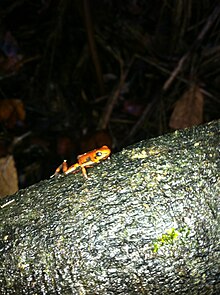Andinobates cassidyhornae
| Andinobates cassidyhornae | |
|---|---|

| |
| Scientific classification | |
| Domain: | Eukaryota |
| Kingdom: | Animalia |
| Phylum: | Chordata |
| Class: | Amphibia |
| Order: | Anura |
| Family: | Dendrobatidae |
| Genus: | Andinobates |
| Species: | A. cassidyhornae
|
| Binomial name | |
| Andinobates cassidyhornae (Amézquita et al., 2013)
| |
Andinobates cassidyhornae, commonly known as Cassidy's Poison Dart Frog, is a species of frog in the family Dendrobatidae[2] found in Colombia in Antioquia in an altitude of 1800–2059 m.[3] They have been observed in areas with thick leaf litter and males have been observed calling between 10 and 14 o'clock within these areas.[3] Their call has been described to sound like a "buzz." [4] Little is known about the parental tendencies of cassidyhornae, but males are known to carry 1-3 tadpoles on their dorsum, and some tadpoles have been found in water containing husks of wettinia.[5]
Cassidyhornae is named after Cassidy Horn in honor of her passion for poison dart flogs and conservation in Columbia.[5]
Female A. cassidyhornae is slightly bigger than a male (a sign of sexual dimorphism).[3] Their mating season likely occurs during the wet season in March-April.
This species is threatened due to disturbance within its preffered habitat and its small range, as well as potential smuggling by the illegal pet trade. It was proposed as critically endangered upon discovery,[5] and is currently listed as vulnerable by the IUCN Red List. [6]
References[edit]
- ^ "Andinobates cassidyhornae". IUCN Red List of Theatened Species. Retrieved 2023-05-27.
- ^ Adolfo Amezquita; Roberto Marquez; Ricardo Medina; Daniel Mejia-Vargas; Ted R. Kahn; Gustavo Suarez; Luis Mazariegos (2013). "A new species of Andean poison frog, Andinobates (Anura: Dendrobatidae), from the northwestern Andes of Colombia". Zootaxa. 3620 (1): 163–178. doi:10.11646/zootaxa.3620.1.8. PMID 26120702. Retrieved 1 June 2023 – via Academia.edu.
- ^ a b c "Andinobates cassidyhornae". Dendrowiki. Retrieved 2023-05-27.
- ^ Mazariegos, Luis A. "Andinobates cassidyhornae". Amphibiaweb. Retrieved 20 April 2024.
- ^ a b c "Andinobates cassidyhornae". Global Biodiversity Information Facility. Retrieved 20 April 2024.
- ^ "Andinobates cassidyhornae". IUCN Red List. IUCN. Retrieved 20 April 2024.

